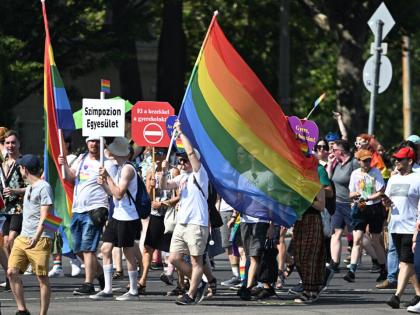Pride Month Parade Ban in Budapest Defied by Mayor, EU Officials Vow to Join
By Lokmat English Desk | Updated: June 20, 2025 07:48 IST2025-06-20T07:47:27+5:302025-06-20T07:48:43+5:30
Hungarian police prohibited the primary Pride march in Hungary from taking place in Budapest on June 28. However, the ...

Pride Month Parade Ban in Budapest Defied by Mayor, EU Officials Vow to Join
Hungarian police prohibited the primary Pride march in Hungary from taking place in Budapest on June 28. However, the mayor of the capital refused to comply, stating that the march would still take place. Since Prime Minister Viktor Orban took back office in 2010, Hungary has enacted a number of legislation that have drawn criticism both domestically and internationally for restricting the rights of the nation's sexual and gender minorities under the pretext of "child protection." The police on their official website stated, "The police, acting within their authority over public assemblies, prohibit the holding of the assembly at the aforementioned location and time." The announcement was made on June 19.
According to police, current laws that forbid promoting same-sex partnerships to minors made the prohibition imperative. They said any appeal against the ruling needs to be submitted to the supreme court of the central European nation within three days.
Despite the restriction, Gergely Karacsony, the liberal mayor of Budapest, promised to hold the event. He said that the police judgment was "no value" because the city council had planned the march and it did not need official authorization from the police. He posted on Facebook, "Budapest city hall will organize the Budapest Pride march on June 28 as a city event. Period."
On Wednesday, a high-ranking official charged the mayor of trying to cheat. Gergely Gulyas, head of Orban's office, said that all events of this type have to be announced, and the police have the right to ban them. No serious legal expert would try to dispute that.
A bill to outlaw any assembly that contravenes a 2021 anti-LGBTQ law was approved by the Hungarian parliament in mid-March. The display or promotion of homosexuality to minors is forbidden by the 2021 law.
Police stated in a ruling released Thursday that minors may be present along the route and that the march "by its very nature cannot be held without the representation" of members of the LGBTQ community. The police said, "If it cannot be stated with absolute certainty that the display is not taking place in the presence of persons under 18 years of age, the assembly would be in breach of the ban."
In April, a resounding majority of Hungarian MPs approved constitutional amendments that reinforced the legal basis for the Pride march ban. According to the administration, the yearly event might take place in a stadium or other enclosed space where kids wouldn't be able to see it.
Also Read: UN chief calls for investment in development to prevent conflict
Hungary has already seen protests due to the dispute around the Pride march. Bridges in the capital were blocked by thousands of protesters calling for the revocation of the ban.
A number of European Parliament members expressed their intention to participate in the procession. According to the march's organisers, ministers from a number of EU nations will also be there, along with European Equalities Commissioner Hadja Lahbib.
Participants could face a punishment of up to 500 euros ($570), which the Hungarian government claims will go towards "child protection" initiatives. Police may use facial recognition technology to identify them.
Open in app